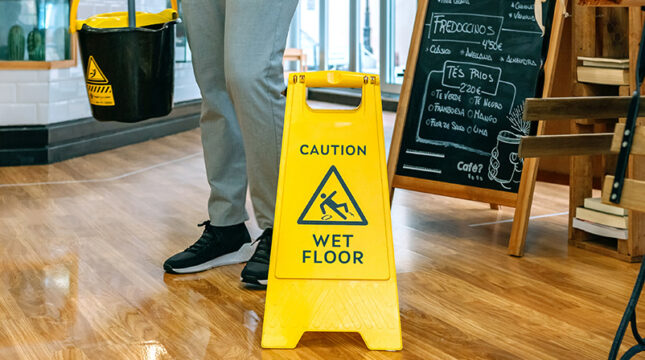Starting a small business involves several crucial steps. And amid all the things you’re taking care of as a business owner, it may be easy to overlook insurance, but it’s an important way to protect your investment. If you ask, "do I need business insurance," the answer is usually "yes" — sometimes as a matter of law.
Apart from those legally required policies, what kind of insurance you need depends on your industry and the potential risks you face.
Who is required to have business insurance coverages?
State laws can require business insurance. If you have employees, most states in the U.S. mandate workers' compensation insurance, disability insurance, and unemployment insurance.
Additionally, your profession may require you to have insurance to maintain a license to practice. For example, contractors working in construction may have to get general liability insurance before signing on to a project.
There are two requirements to think about when it comes to industry-specific insurance: state law and where you work. For example, in the state of New York, doctors aren’t required to carry medical professional liability insurance unless they’ve been subject to disciplinary action. However, most New York medical facilities still require doctors to get this coverage before treating patients.
So why get small business insurance if it’s not required?
Suppose you don't have any employees, and it's not mandatory in your industry. In that case, other types of business insurance aren't required. But, you're taking a big risk of being sued and having to pay costs or settlements out of pocket without it.
Although certain business structures, like LLCs and corporations, may protect your personal assets against financial losses, your business assets may still be at risk. Insurance can ensure that accidents and mistakes don't cause your business to go under because of an unfortunate series of events.
What kind of insurance should you have?
So, what insurance does a small business need? That depends on the kind of work you do. This list of options can get you started on choosing business insurance policies.
General liability insurance
This covers you for losses that stem from bodily injuries, damage to other people’s property and more. If you don't have general liability insurance, you will have to cover the cost of defending a lawsuit, repairing property damage, and paying for medical expenses if your business is responsible.
For example, if you’re a general contractor and accidentally damage plumbing, it can cost an average of $450 to $7,000 to repair water damage — and that's a modest example of potential property damage.
Workers compensation insurance
Workers’ comp provides insurance coverage for lost wages, medical expenses and more if you or an employee gets injured at work. The workers’ compensation system ensures workers are taken care of if they’re hurt on the job while also protecting business owners from significant financial losses after an accident.
According to the National Security Council, the average cost for a workers’ comp claim is $42,008. Cost-wise, buying workers’ comp coverage and not having to pay out of pocket is a much better deal for your business.
Professional liability insurance
Professional liability insurance is the right coverage if you offer professional service to clients. Sometimes, due to malpractice, errors, or negligence, those clients or others may suffer harm. Without the safety net insurance provides, you are on your own to defend a lawsuit and to pay out any settlements or judgments.
For example, if you're an accountant, say your client sues you for making a mistake in your paperwork, causing them to lose out on significant tax advantages. The client could have grounds for legal action against you. Professional liability will cover related expenses up to your insurance policy limits. This includes your lawyer and legal fees and judgments if you are ruled liable for your client's losses.

Commercial property insurance
If you own or lease business property, you want to protect it, as you would protect your house with homeowner’s insurance. Commercial property insurance provides coverage for damage or vandalism to your equipment and inventory. It also can cover lost income, operating expenses and repairs to your building.
For instance, the National Fire Protection Association found that an estimated average of 7,410 structure fires in eating and drinking establishments were reported to fire departments annually over four years. Insurance helps owners pay for damages a kitchen fire causes and even the loss of business income if you have to close while temporarily making repairs.
Commercial auto insurance
If you’re driving to different locations, making deliveries or providing services where you regularly use a vehicle, you’ll need commercial auto coverage. Commercial auto insurance can help cover costs related to accidents, such as towing, repairs and rental reimbursement.
But what if you use your personal vehicle as your business vehicle and already have personal auto insurance? Nice, but you need to check your insurance agent or insurance company. Most personal auto insurances won't cover you if you get into an accident while driving for business purposes.
Tools and equipment insurance
This insurance covers the cost of repairs and replacements for damaged or stolen work gear. It’s good liability coverage to have if your profession involves bringing your equipment to different locations to do your job. Without the right insurance, you’d be paying out of pocket to replace or repair your gear.
Why you can't rely on waivers
Some business owners ask themselves, "What kind of insurance do I need if I use waivers?" The answer is that you need the same insurance as a business that does not use business liability waivers.
These forms, signed by your clients or customers, may protect you from some liability. But, they don't stop anyone from trying to sue you, and even the best waiver is still vulnerable to challenge. Even if your waiver is airtight, you can still be sued for gross negligence or intentional torts.
In other words, it's smart to have an enforceable waiver, but you also need insurance for backup.
Some business insurance includes funding for your legal defense — not just the cost of a settlement. Without insurance, you have to pay out of pocket for your own lawyers, which can cost you a considerable amount — even if the person who signed the waiver can't get out of it.
Bottom line: Having business insurance offers peace of mind
Having insurance offers more benefits than just financial security — it eliminates some of the worries on your shoulders. You can feel some sense of comfort knowing that your policy will offer some coverage when something unexpected occurs.
The cost of premiums is a modest investment for what you get in exchange, knowing you're supported after a break-in, injury or catastrophic natural disasters.
Besides providing you with peace of mind, it conveys to your customers and financial partners that you're a reliable choice by being prepared. It shows that you care about the quality of your products and services and the safety of your employees.
NEXT Insurance protects small business owners
So, does a business have to have insurance? The answer is not always, but it makes good sense. NEXT Insurance provides affordable business insurance tailored to your specific needs.
It’s 100% online insurance with 24/7 online access, so you can always access and manage your insurance from anywhere. You can complete an application, see your coverage options, get a quote and get your certificate of insurance in less than 10 minutes. Our customized insurance packages allow you to mix and match policies to get just the right amounts and types of coverage.







